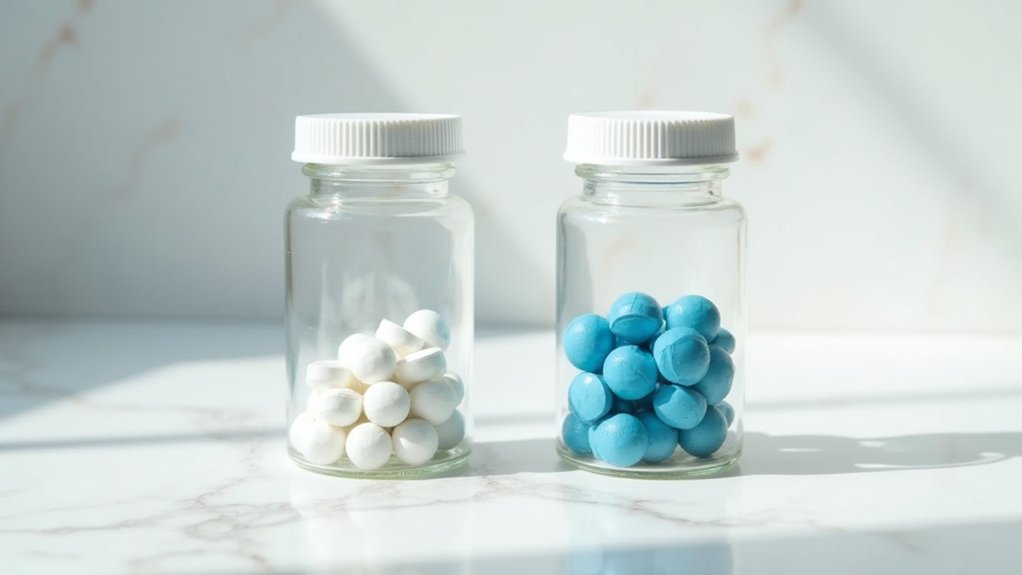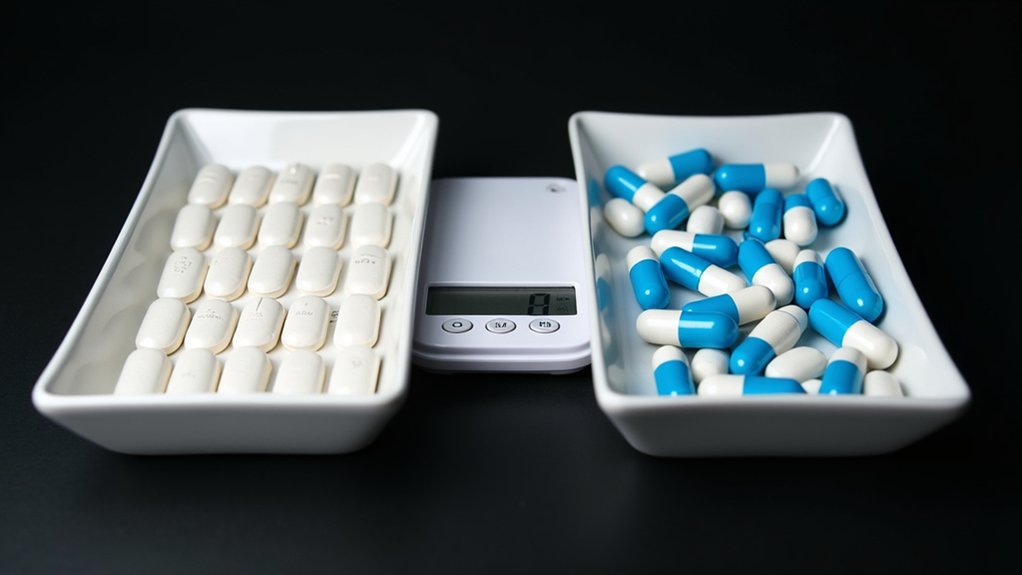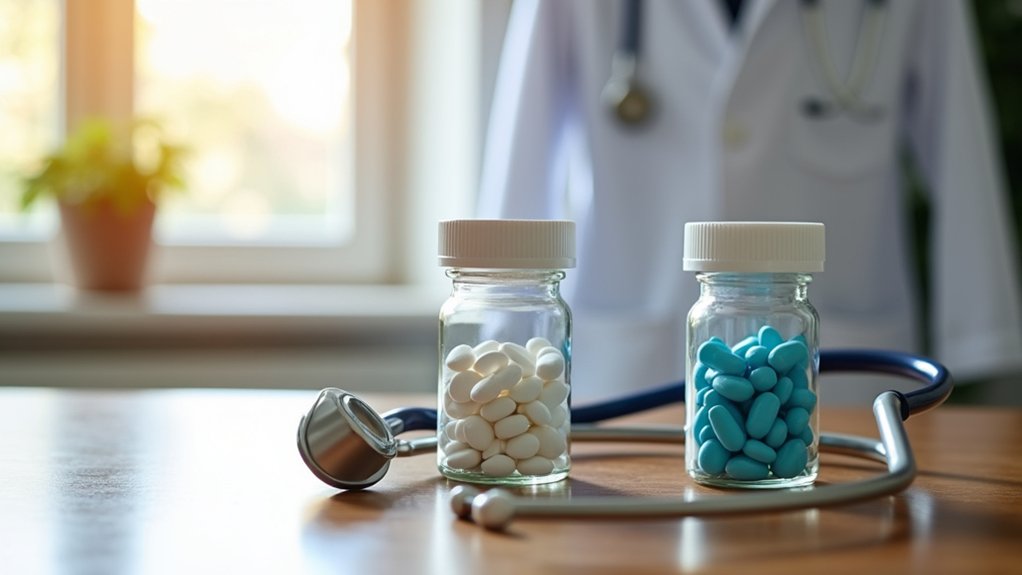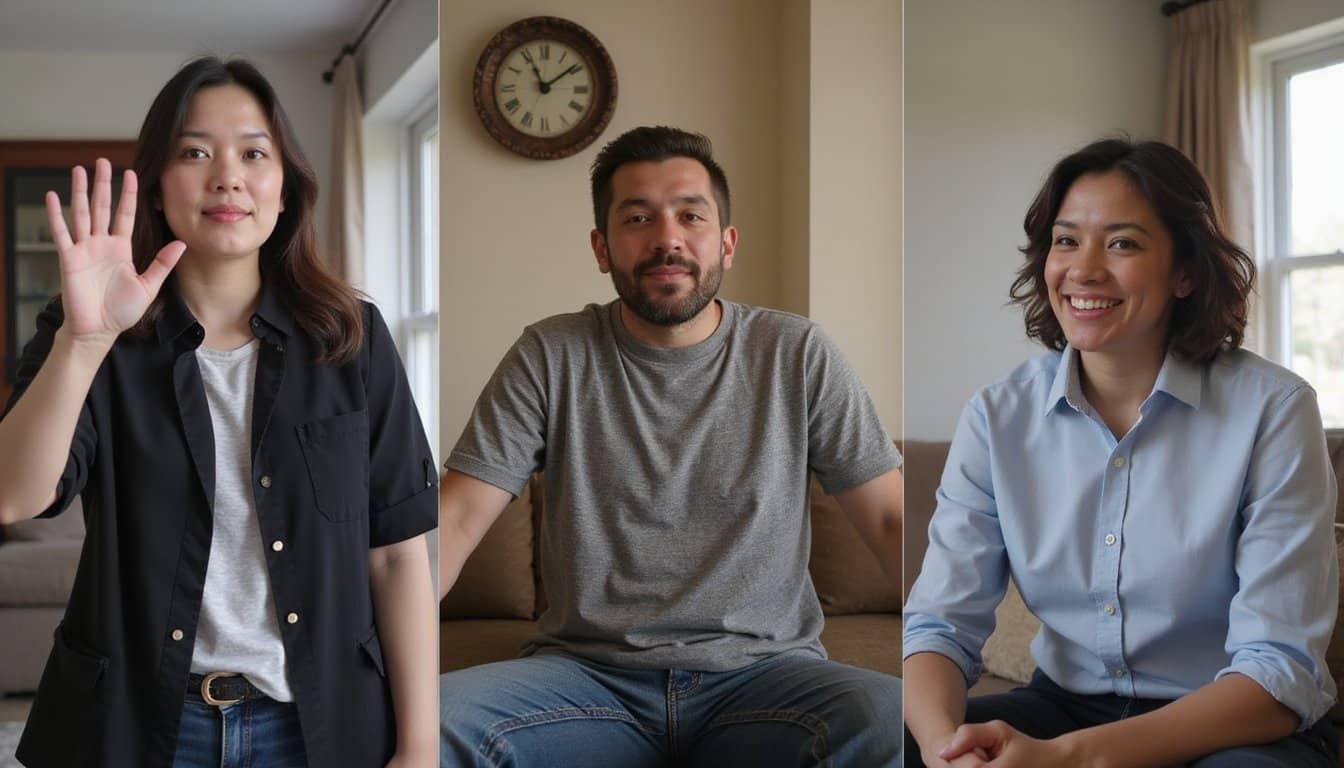Generic antidepressants contain identical active ingredients to brand names but can cost up to 85% less. While both meet FDA bioequivalence standards (80-125% blood levels), they may differ in inactive ingredients, potentially affecting individual responses. You’ll need to take into account insurance coverage, as brand names often require prior authorization and higher copays. Working closely with your healthcare provider guarantees proper monitoring when switching between formulations. Understanding the key differences will help you make an informed treatment decision.
Understanding the Basics of Generic and Brand Name Antidepressants

While many patients assume generic and brand-name antidepressants are identical, several key differences exist in their formulation and regulatory oversight. Generic formulations must meet FDA standards showing blood levels between 80% to 125% of the brand version, though the active ingredients remain the same. The main variations lie in inactive components like binders and coatings, which can affect how quickly your body absorbs the medication. When switching between brand and generic medications, some patients experience a return of depression during the transition period. The Hatch-Waxman Act of 1984 made it easier for generic medications to enter the market by requiring only bioequivalence testing rather than full clinical trials. Most doctors recommend maintaining treatment for at least six months to prevent depressive symptoms from returning.
Research shows that brand efficacy isn’t always perfectly matched by generics, particularly with older antidepressants like tricyclics. While generic medications undergo bioequivalence testing, they receive less extensive clinical trials and post-market monitoring compared to brand-name drugs. You’ll find that multiple generic versions of the same antidepressant may exist, each with distinct inactive ingredients that could influence your body’s response to the medication.
Cost Comparison and Insurance Coverage
When comparing antidepressant costs, generic medications offer substantial savings at 85% less than their brand-name counterparts. You’ll find common generics like escitalopram at $7.19 and duloxetine at $11.87 per month, while brand-name versions can cost considerably more. For example, Trintellix costs $2.95 daily for treatment of major depressive disorder, making it significantly more expensive than generic alternatives.
Insurance coverage heavily favors generics, with most plans offering lower copays and fewer restrictions. Brand-name medications often require prior authorization and higher out-of-pocket expenses. If you’re uninsured, you’ll find generics more affordable, with some medications costing under $15 for a 30-day supply. Due to recent website restrictions, patients may experience access issues when trying to verify medication pricing online.
To maximize savings, consider using pharmacy discount coupons or patient assistance programs. The economic impact is substantial; generic antidepressants contributed to $253 billion in healthcare savings in 2017, with a 43.7% reduction in six-month treatment costs compared to brand names.
Quality Standards and Bioequivalence Requirements

Although generic antidepressants must meet rigorous FDA standards, their approval process differs considerably from brand-name medications. Generic manufacturers don’t repeat clinical trials but must demonstrate bioequivalence testing showing their products deliver 80-125% of the active ingredient compared to brand-name versions. The abbreviated new drug application streamlines the approval timeline while maintaining safety requirements. Quality assurance processes require strict adherence to Good Manufacturing Practices, ensuring consistent batch-to-batch reliability. Past studies have shown little quality difference between generic and brand-name medications in most cases. Regular plant inspections by the FDA help maintain high manufacturing standards across all facilities.
- You’ll find generics contain identical active ingredients but may use different inactive components (fillers, coatings) that could affect absorption
- Your generic medication undergoes continuous FDA monitoring for quality and stability throughout its shelf life
- You should expect generic antidepressants to show bioequivalence within 4-20% of brand-name absorption rates
- You might notice variations between different generic versions since they’re only required to match the brand-name, not each other
Safety and Side Effect Considerations
When shifting between antidepressant formulations, you’ll need regular monitoring of blood levels to guarantee therapeutic effectiveness and detect potential adverse reactions. You should watch for unexpected side effects, as individual responses can vary greatly when switching between brand-name medications and their generic counterparts. If you experience new symptoms after a medication change, these may stem from sensitivities to different inactive ingredients, which can affect how your body processes the medication. Patients taking medications like esketamine require certified healthcare monitoring during administration. The best approach is to work with your healthcare provider to find your ideal medication through persistence in treatment, as the first antidepressant tried may not always be the most effective option.
Monitoring Blood Level Changes
As patients shift between brand-name and generic antidepressants, monitoring blood level changes becomes essential for guaranteeing therapeutic efficacy and safety. When you’re altering medications, your healthcare provider will implement specific monitoring protocols to track blood level fluctuations, which can vary considerably between 80-125% of the brand-name equivalent. Due to variations in binding chemicals and fillers, patients may respond differently to generic versions compared to brand-name medications. Regular assessment helps identify the need for dose adjustments, particularly if you experience symptom recurrence or unexpected side effects.
- Drug concentration testing determines if you’re maintaining therapeutic blood levels
- Genetic factors and pre-existing conditions may require dosage modifications
- Regular monitoring helps identify inadequate responses requiring dose escalation
- Consistent follow-up enables early detection of adverse reactions or reduced efficacy
Your provider should track these parameters closely, especially during the initial alteration period, to guarantee ideal treatment outcomes and minimize potential complications.
Adverse Reaction Variations
Despite identical active ingredients, generic and brand-name antidepressants can exhibit varying adverse reaction profiles due to differences in their inactive components and formulation methods. You’ll find that these variations primarily stem from differences in drug absorption rates and peak concentrations, which can affect your tolerability. Common issues like upset stomach and headaches can occur with either formulation type.
Individual variability plays an essential role in how you’ll respond to either medication type. Your genetic makeup, liver function, and existing health conditions greatly influence drug metabolism and adverse reactions. When switching between generic and brand-name antidepressants, you’ll need close monitoring as formulation differences might trigger unexpected side effects. While both options must meet FDA bioequivalence standards, your unique physiological factors may cause you to experience different adverse reactions. Consider discussing these potential variations with your healthcare provider to optimize your treatment approach.
Inactive Ingredient Sensitivities
Inactive ingredients in antidepressant medications play an essential role beyond their basic formulation functions, potentially triggering sensitivities in certain patients. When switching between brand-name and generic antidepressants, you’ll find variations in excipients that can affect how your body responds to the medication. These inactive ingredients influence drug absorption, stability, and bioavailability, even though they don’t directly impact therapeutic efficacy. If you experience access issues while researching medication information online, some pharmaceutical websites may employ security blocks to protect sensitive data. With medications like Auvelity, a key consideration is that it must be taken twice daily, unlike some other antidepressant options.
Key allergen risks to take into account:
- Lactose fillers may cause digestive issues in lactose-intolerant patients
- Specific coating materials could trigger allergic reactions
- Different binding agents between brands may affect absorption rates
- Alternate salt forms (hydrochloride vs. hydrobromide) might cause varying sensitivities
Understanding these differences becomes important when you’re experiencing unexpected reactions or contemplating switching between brand-name and generic antidepressants.
Making the Switch: What Patients Need to Know
When shifting between antidepressant medications, you’ll need to carefully monitor your body’s response to detect any changes in effectiveness or side effects. You should maintain daily written records of medication changes, symptoms, and any new physical or emotional reactions that occur. Schedule regular check-ins with your healthcare provider to discuss your shifting experience, as dose adjustments or alternative medications may be necessary based on your individual response.
Monitor Your Body’s Response
The shift between antidepressant medications requires vigilant monitoring of your body’s response to identify potential complications and guarantee treatment success. Maintain a detailed medication diary to track both therapeutic effects and adverse reactions during your change period. Symptom tracking should focus on physical and emotional changes, particularly during the initial 4-6 weeks when side effects typically peak. A conservative switching strategy may be recommended by your healthcare provider to minimize potential complications during the transition. It may take up to 1 month before you notice improvements with your new medication.
- Watch for signs of serotonin syndrome, including agitation, fever, or muscle rigidity
- Document sleep patterns, appetite changes, and gastrointestinal disturbances
- Monitor sexual function and weight fluctuations, as these commonly affect medication adherence
- Report severe symptoms like persistent headaches, confusion, or suicidal thoughts immediately
If you experience rapid mood destabilization or neurological symptoms, don’t wait; contact your healthcare provider. Regular assessments help optimize your dosage and guarantee a successful medication change.
Talk With Your Doctor
Scheduling an in-depth consultation with your healthcare provider marks an essential first step before switching between antidepressant medications. You’ll need to discuss generic medication options and brand-name efficacy, particularly for medications like Cymbalta, Lexapro, and Pristiq, which have varying generic availability.
Your doctor will evaluate your specific needs, considering factors such as dose titration requirements and potential combination therapies. They’ll create a structured shift plan that may include trying different generic brands or reverting to brand-name medications if needed. You’ll also receive guidance on monitoring symptoms during the switch and adjusting dosages to maintain therapeutic effectiveness. It’s critical to maintain open communication with your healthcare provider throughout this process, especially if you experience any changes in symptoms or side effects during the shift period.
Track Medication Changes Daily
Building on your doctor’s guidance, daily medication tracking serves as a fundamental component of successful antidepressant changes. Through systematic symptom documentation and side effect monitoring, you’ll generate valuable data to inform treatment decisions. Utilize structured tracking methods to capture your response to medication adjustments.
- Maintain a daily journal documenting mood fluctuations, energy levels, and side effects using numerical ratings for objective assessment
- Record specific timing of symptoms relative to medication doses, particularly when switching between brand and generic formulations
- Monitor changes in sleep patterns, appetite, and other physical symptoms that may indicate therapeutic effectiveness
- Log any adverse reactions immediately, including severity and duration, to help your provider make necessary adjustments
This systematic approach enables evidence-based evaluation of how different formulations affect your symptoms and overall treatment response.
The Role of Individual Patient Response
While depression medications share common mechanisms of action, individual patient responses can vary greatly based on multiple factors, including bioavailability, formulation differences, and genetic predisposition. You’ll notice that even within the same drug class, individual efficacy can differ remarkably – for example, Pristiq rates higher (6.9) than Effexor (6.6) among users.
Your personalized treatment success may depend on formulation specifics, as extended-release versions often perform differently than immediate-release options. Patient satisfaction data shows considerable variation: newer combinations like Auvelity achieve 50% response rates at 6 weeks, while traditional options like armodafinil and alprazolam score higher in user reviews (8.3 and 8.5 respectively). When switching between brand names and generics, you’ll need to monitor your response carefully, as bioavailability and inactive ingredients can impact treatment outcomes.
Working With Healthcare Providers to Make the Best Choice

Selecting the ideal antidepressant medication requires a collaborative partnership between you and your healthcare provider. Through ongoing patient education and discussions about your specific needs, your provider can help determine whether generic or brand-name medications are most appropriate. Regular monitoring and open communication about medication adherence, side effects, and treatment response will help optimize your care.
- Discuss your medical history, lifestyle factors, and any previous experiences with antidepressants to help inform medication selection
- Ask questions about the differences between generic and brand options, including potential cost savings and insurance coverage
- Report any changes in symptoms or side effects promptly, especially when switching between brand and generic versions
- Work with your provider to develop a monitoring plan that includes regular check-ins and assessments of your treatment progress
Frequently Asked Questions
Can I Split or Crush Generic Antidepressants Like Their Brand-Name Counterparts?
You shouldn’t automatically split or crush generic antidepressants without consulting your healthcare provider first. Dosage considerations depend on the specific medication formulation; only scored tablets can be safely split. Crushing tablets can disrupt extended-release mechanisms and alter therapeutic effects. Never split or crush capsules, as this compromises their designed delivery system. If you’re having trouble taking your medication, discuss alternative options with your prescriber.
How Long Should I Wait Before Deciding if a Generic Works?
You should follow the same generic medication timeline as brand-name antidepressants for effectiveness evaluation. Monitor your response for 4-8 weeks, as this is typically when you’ll notice significant improvement. You’ll likely see initial changes in sleep or appetite within 1-2 weeks, but don’t make decisions about the medication’s efficacy before 8 weeks. If you’re not experiencing benefits by 12 weeks, consult your healthcare provider about potential adjustments.
Do Generic Antidepressants Expire Faster Than Brand-Name Medications?
No, generic antidepressants don’t expire faster than brand-name versions. Expiration dates are determined by stability testing, not by whether the medication is generic or brand-name. You’ll find similar shelf lives for both types when you store them properly. Proper medication storage, keeping drugs in a cool, dry place away from direct sunlight, and following temperature guidelines matter more than whether it’s generic or brand-name in determining how long your medication remains effective.
Can Genetic Testing Help Determine if Generics Will Work for Me?
Yes, genetic testing benefits can help predict your response to both generic and brand-name antidepressants. The tests analyze your DNA to understand medication response variability, focusing on how your body metabolizes drugs rather than distinguishing between generics and brands. Since generics contain the same active ingredients as brand-name medications, your genetic markers will influence their effectiveness the same way. You’ll get insights about medication compatibility regardless of the manufacturer.
Should I Take Generics With Food Differently Than Brand-Name Antidepressants?
You should generally follow the same food interaction guidelines for both generic and brand-name antidepressants. While bioequivalence testing confirms similar active ingredient behavior, individual responses may vary. If you experience new side effects after switching, don’t modify your dosage adjustments independently. Instead, maintain consistent food timing and consult your healthcare provider, who can monitor your response and make necessary adjustments to optimize your treatment’s effectiveness.






